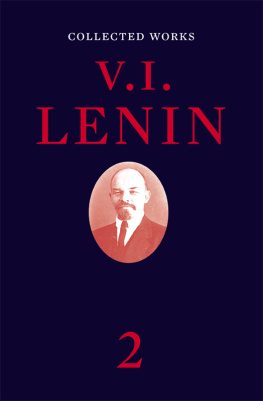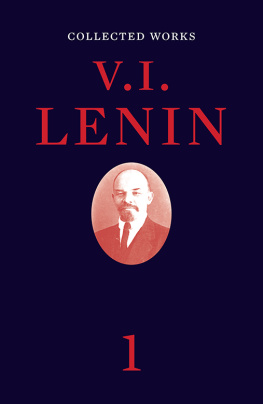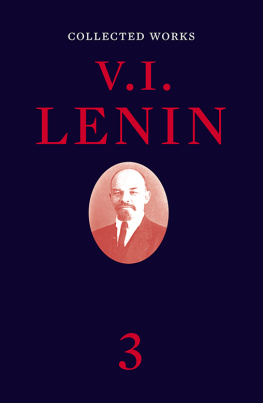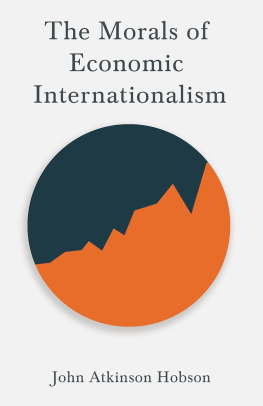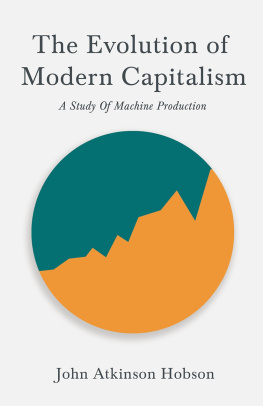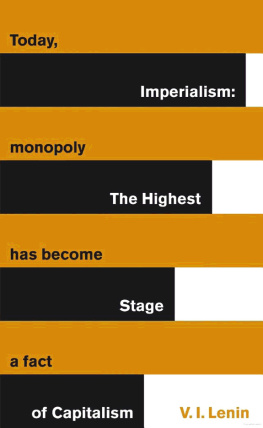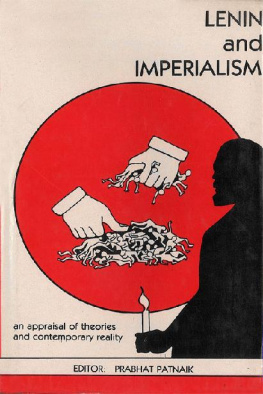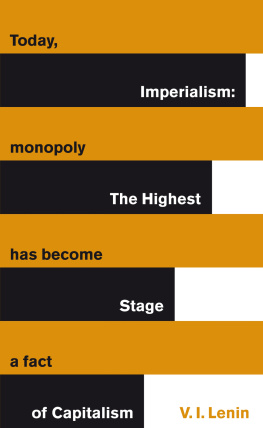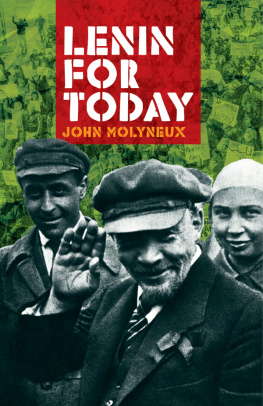
IMPERIALISM AND WAR
V. I. Lenin and N. I. Bukharin
Edited by Phil Gasper

Haymarket Books
Chicago, Illinois
2017 Phil Gasper
Published in 2017 by
Haymarket Books
P.O. Box 180165
Chicago, IL 60618
773-583-7884
www.haymarketbooks.org
ISBN: 978-1-60846-945-1
Trade distribution:
In the US, Consortium Book Sales and Distribution, www.cbsd.com
In Canada, Publishers Group Canada, www.pgcbooks.ca
In the UK, Turnaround Publisher Services, www.turnaround-uk.com
All other countries, Ingram Publisher Services International,
This book was published with the generous support of Lannan Foundation and Wallace Action Fund.
Library of Congress Cataloging-in-Publication data is available.
Editors Note
Both works in this collection contain footnotes and interpolations by the various editors as well as the original authors. V. I. Lenin is identified by his last name, while Nikolai Bukharin is identified by NB. In the Lenin text, CW refers to the editor of Lenins Collected Works, while in Bukharin, Ed. indicates the editor of the 1929 publication. PG refers to the editor of the present volume.
Acknowledgments
This edition of the classic works on imperialism by Lenin and Bukharin has been a long time coming. For a variety of personal and political reasons, it took me much longer to complete than I originally anticipated, but my friends at Haymarket Books, especially Anthony Arnove, showed remarkable patience, and for that I thank them. I also want to thank Brian Baughan, Nisha Bolsey, Rachel Cohen, and Dao Tran, the Haymarket editors who saw the project through to completion.
Over the years I have received advice, assistance, and encouragement from a very large number of people, including Jeff Bale, Eric Blanc, Sarah Blaskey, Todd Chretien, Don Gasper, Sarah Grey, Charlie Hore, Rick Kuhn, Einde OCallaghan, John Riddell, Dan Shippee, Elizabeth Terzakis, Tina Tre-vio-Murphy, and Colin Wilson. Many thanks to all of them, and to anyone I have forgotten to include on that list.
As I was getting close to completing my work on this book, I heard the tragic news that my friend and comrade Aaron Hess had died at far too early an age. In the fall of 2008, Aaron asked me to give a talk in Madison, Wisconsin, on Lenins theory of imperialism, some of which eventually found its way into the introduction to this book. Aaron spent almost the entirety of his adult life as a socialist, an anti-war activist, and an anti-imperialist. I would like to dedicate my contribution to this volume to his memory.
PG
April 2017
Introduction
V. I. Lenins Imperialism: The Highest Stage of Capitalism and Nikolai Bukharins Imperialism and World Economy were both written in the midst of the carnage of the First World War. Both Lenin and Bukharin were leading figures in the militant Bolshevik wing of the Russian Social Democratic Labor Party. The Bolsheviks were one of a very small number of socialist groups in Europe to denounce the war as an imperialist conflict and to refuse to support their own government.
On one side of the war were Britain, France, and Russia; on the other, Germany, Austria-Hungary, and the Turkish Ottoman Empire. In the decade leading up to the war, the Second International (an association of the worlds leading socialist parties) had passed numerous resolutions pledging to oppose war between the big powers if and when it broke out. But when war was finally declared in August 1914, socialists in the German parliament overwhelmingly voted for war credits, arguing that they had to defend civilization against the despotism of the Russian tsar. French socialists responded by saying they had to defend revolutionary France against Prussian militarism. The British Labour Party supported Britains entry into the war, and so on down the line. Lenin was so surprised by this betrayal, particularly of the German Social Democratic Party, that he initially refused to believe that it was true. His comrade Gregory Zinoviev recounted Lenins reaction a few years later:
When the war broke out we were living in a god-forsaken little mountain village in Galicia. I remember having had a bet with him. I said You will see, the German Social Democrats will not dare vote against the war, but will abstain in the vote on the war credits. Comrade Lenin replied: No, they are not such scoundrels as all that. They will not, of course, fight the war, but they will, to ease their conscience, vote against the credits lest the working class rise up against them. In this case Lenin was wrong, and so was I. Neither of us had taken the full measure of the flunkeyism of the social patriots. The European Social Democrats proved complete bankrupts. They all voted for the war credits. When the first number of the Vorwrts, the organ of the German Social Democrats, arrived with the news that they had voted the war credits, Lenin at first refused to believe. It cannot be, he said, it must be a forged number. Those scoundrels, the German bourgeoisie, have specially published such a number of the Vorwrts in order to compel us also to go against the International. Alas, it was not so. It turned out that the social patriots really had voted the war credits. When Lenin saw it, his first word was: The Second International is dead.
Lenin and Bukharin were both trying to explain how the war was rooted in profound economic changes, but they were also intervening in the sharp political debate that had torn apart the international socialist movement when the war began. Both of them argued that the war was an imperialist conflict in which all sides were trying to grab more territory and extend their power and influence, or at the very least hang on to territories to which they had no right in the first place. People who called themselves socialists but who nevertheless found excuses to support their own governments had betrayed the working class and the socialist movement. Those who privately opposed the war but refused to make their opposition public were just as bad. Lenin himself advocated the sharpest opposition to the war, arguing that socialists should not just refuse to support their own ruling classes, but that they should openly call for their defeat.
Similarly, Lenin supported the right of oppressed nations to self-determination. National independence could not bring about genuine liberation without the abolition of class divisions and the overthrow of capitalism, but the fight for independence would weaken imperialism, and support for that fight by workers in the oppressing nation would cut against national chauvinism and make possible the emergence of a genuinely internationalist socialist movement.
Lenins main goal in Imperialism was to show how the colonial expansion of the major world powers in the late nineteenth and early twentieth centurieswhich led to inter-imperial rivalry and eventually warwas rooted in significant changes in the nature of capitalism during the same period. That is why he called imperialism at the beginning of the twentieth century a stage of capitalism. Lenins claim has confused some of his readers, so it is worth pointing out that he was not saying that there was no imperialism before the late nineteenth century. Rather, he was pointing out that the nature of imperialism had changed:





